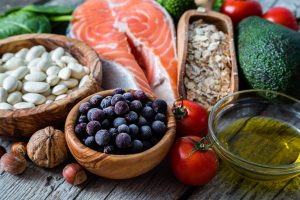 Diet has a large impact on our health. What we eat can either keep us energized or make us sick. Consuming saturated fats, sodium, and sugar-loaded foods as a fuel isn’t good for health in the long run, as our bodies do not get all the necessary nutrients and become prone to serious health conditions, like diabetes and heart disease. So eating natural foods as much as possible and avoiding processed and fast foods makes a lot of sense.
Diet has a large impact on our health. What we eat can either keep us energized or make us sick. Consuming saturated fats, sodium, and sugar-loaded foods as a fuel isn’t good for health in the long run, as our bodies do not get all the necessary nutrients and become prone to serious health conditions, like diabetes and heart disease. So eating natural foods as much as possible and avoiding processed and fast foods makes a lot of sense.
Speaking of cardiovascular health specifically, eating particular heart-friendly foods can go a long way in keeping the heart working properly. The heart is the body’s powerhouse as it ensures that a healthy blood supply reaches all the organs and tissues to keep them nourished. (Miracle molecule helps boost circulation.)
Advertisement
The good news is, there are certain foods that offer great health benefits and protection to the heart. Adding these foods into your diet can go a long way in supporting your heart.
Below you will find the top 16 foods you should eat to keep your heart healthy.
16 superfoods for your heart
Salmon: Salmon, along with other fatty fish, provides heart-healthy nutrients which have been shown to lower the risk of arrhythmias and atherosclerosis (plaque buildup along the artery walls). The American Heart Association recommends consuming fish two times a week.
Oatmeal: Oatmeal is high in soluble fiber, which is linked to lower cholesterol levels. But be mindful of the type of oatmeal you eat – the instant variety tends to be high in sugar. Opt for old-fashioned oats instead. (Italian secret is now proven to lower cholesterol.)
Blueberries: Blueberries, and other berries, are high in antioxidants. One study found that women who consumed over three servings of blueberries and strawberries had a 32 percent lower risk of heart attack, compared to those who consumed less.
Dark chocolate: There have been numerous studies that have linked dark chocolate to a healthy heart. One in particular found that daily consumption of dark chocolate could help lower the risk of a non-fatal heart attack or stroke. Dark chocolate refers to over 60 percent cocoa.
Citrus fruits: Citrus fruits like grapefruits have been linked to a reduced risk of ischemic stroke. They are also high in other vitamins and nutrients that can help reduce the risk of heart disease.
Potatoes: Although many people assume white potatoes are the “bad” starch, these root vegetables do hold some heart-healthy properties. Potatoes are rich in potassium, which is known to help lower blood pressure. They are also high in fiber, which helps prevent heart disease too. (Your heart needs an army of defenders to fight its #1 enemy.)
Tomatoes: Tomatoes are a good source of potassium and contain powerful antioxidants that help protect the heart.
Nuts: All types of nuts are high in heart-protecting fiber, along with other vitamins and nutrients that work to reduce bad cholesterol. However, nuts are high in calories, so you should stick with a handful a day.
Legumes: Beans and lentils are high in protein, and one study found that those who consumed legumes at least four times a week had a 22 percent lower risk of heart disease, compared to those who ate them once a week.
Extra virgin olive oil: People who follow the Mediterranean diet, which is high in extra virgin olive oil, are known to have healthier hearts. Olive oil is a good source of monounsaturated fat, which can improve cholesterol and sugar levels.
Red wine: A small amount of red wine has been linked to better heart health. Studies suggest the antioxidants in red wine help reduce the risk of heart disease. If you’re not a drinker, though, the same antioxidants can be found in peanut butter and grapes, too. (Regain some of your youth and live a healthier, better life!)
Leafy greens: Leafy greens are packed with antioxidants, which can rid your body from potentially harmful compounds. They are also high in fiber and other minerals and vitamins that work to support a healthy heart.
Coffee: Studies have linked coffee consumption with a reduced risk of heart disease and stroke. Watch what you add in your coffee, though, additional sugar and cream may negate some of the benefits and add on extra pounds.
Flaxseed: Seeds of flax are high in fiber, along with other nutrients. They can be added into just about any meal or smoothie to give you an extra health kick.
Avocado: Another source of healthy fat, avocados can help lower the risk of heart disease and provide you with potassium and antioxidants.
Advertisement
Pomegranates: Pomegranates are known sources of antioxidants, which can help reduce hardening of the arteries. If you aren’t a fan of pomegranates, you can find some of these antioxidants in apples as well.
As you can see, there are many foods that can help improve your heart health. Just keep in mind that the more variety you have in your diet the more nutrients and vitamins you can receive, which all can work to benefit your health. Also remember that moderation is key with any diet. When it comes to eating, less is more. Overeating a certain food – even a health food – doesn’t mean you will receive additional benefits. It’s all about aiming for that perfect balance.
Related: Take these tips to heart: How to better your heart health
